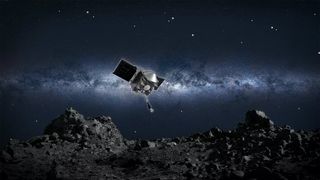Editor's pick: The top space stories of 2023
Aliens made headlines in 2023, but are we really any closer to finding life beyond Earth? A recap of the best new evidence, and other remarkable stories from the year in space.

It's hard to separate the signal from the noise. That's true for astronomers trying to detect chemical signs of life on distant planets — and it's just as true for science enthusiasts on Earth trying to make sense of the endless stream of discoveries being beamed into their newsfeeds.
Asteroid Bennu stumps scientists with its odd makeup

2023 was a noisy year for space — especially when it came to the search for extraterrestrial life. High-profile congressional hearings in the U.S. and Mexico had many people convinced that, not only have aliens crash-landed spaceships on Earth, but they also left behind some three-fingered mummies for our perusal. Despite a complete lack of scientific evidence, these claims dominated news cycles for weeks, overshadowing some truly remarkable extraterrestrial studies that could guide decades of future space exploration.
For example: in the past year, scientists found evidence of organic molecules — the so-called building blocks of life crucial to all species on Earth — everywhere from gargantuan geysers on Saturn's moon Enceladus, to rocks in a Martian crater, to the planet-forming disk of an infant star system 1,000 light-years away. In two of my favorite discoveries of the year, researchers also detected tantalizing traces of organics in dust samples collected from the asteroids Ryugu and Bennu, bringing to fruition two ambitious, years-long missions to scrape the surfaces of speeding space rocks and return their contents to Earth. As Live Science contributor Sharmila Kuthunur reported on asteroid Bennu, those samples still contain more mysteries than answers, and will likely continue to surprise us into 2024 and beyond.
The universe is filled with a 'gravitational wave background'

All of this suggests that the seeds of life may be far more prevalent in space than we previously thought. And if there are aliens out there, they can join us in appreciating a new component of the universe that was discovered this year: the gravitational wave background.
Gravitational waves are ripples in the fabric of space-time first predicted by Einstein. Now, after a rigorous 15-year search, astronomers think they've detected a slight but ever-present background of waves unleashed by the extreme interactions between supermassive black holes. These invisible waves are moving through Earth — and through you — even now.
The James Webb telescope has broken cosmology

In a final landmark this year, Dec. 25 marked the two-year anniversary of the powerful James Webb Space Telescope's (JWST) launch. The last two years have been overflowing with fascinating discoveries and spectacular images of the cosmos — but one of JWST's most important findings confirms a problem that has vexed cosmologists for more than a decade: The universe is expanding, but none of our models can agree on how fast. As Live Science staff writer Ben Turner wrote in honor of the telescope's birthday, "something is awry in our expanding cosmos" — and JWST's incomparable vision is only making things worse.
We hope that Live Science has helped you cut through some of the noise this year, and allowed you to discover science stories that fill you with curiosity and wonder for our vast, mysterious universe. Thanks for reading, and we hope to see you again in 2024.
Sign up for the Live Science daily newsletter now
Get the world’s most fascinating discoveries delivered straight to your inbox.

Brandon is the space/physics editor at Live Science. His writing has appeared in The Washington Post, Reader's Digest, CBS.com, the Richard Dawkins Foundation website and other outlets. He holds a bachelor's degree in creative writing from the University of Arizona, with minors in journalism and media arts. He enjoys writing most about space, geoscience and the mysteries of the universe.
Most Popular

By Deepa Jain

By Tom Metcalfe

By Deepa Jain
